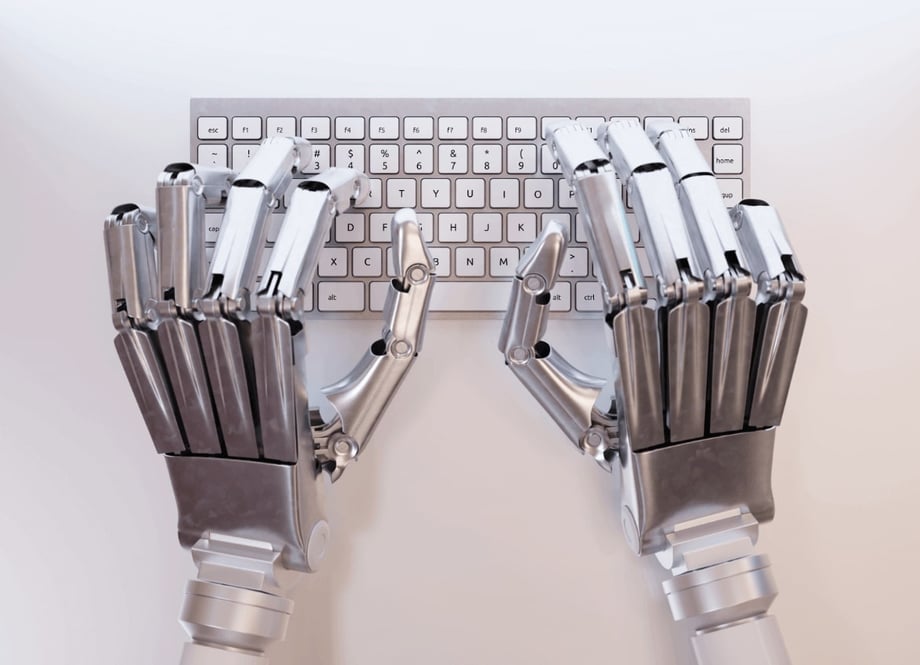4 Misconceptions of Artificial Intelligence in the Workplace

Artificial Intelligence, or AI, is definitely a buzzword right now. Most people have heard about it, but do you really know what it is? A lot of people are afraid of the AI in the workplace. What is this beast? This fear is usually caused by the unknown. You don't know what it is exactly, so you become afraid of it. Maybe one is fearful of how AI is transforming the workplace, or might eventually affect their life, personally.
Artificial intelligence sparks many misconceptions. Misconceptions that arise from this experienced fear together with either misinformation or a total lack of information on the subject. This article will go through some of the main misconceptions, and try to bring it down to earth a bit, and explain what AI means and how it might affect your life.
1. "AI will take over my job"
That is probably the main fear and misconception among people. Will artificial intelligence suddenly push me out of the job market and into long-term unemployment? Well, yes and more importantly, no. AI will eventually take over an increasing number of positions. As AI improves, it will be more efficient and will perform certain tasks better than any human on this planet. For example, AI can compile vast amounts of data from various sources, process the data in a matter of seconds, and give you the best possible suggestions for what actions to take. A human is just not able to do this on the same scale.
But what does that mean for your job? Well, in most cases it doesn't mean unemployment. The many initial years, it will merely mean that the AI will assist you with more of your mundane tasks, while you'll have more time for the creative parts of your work. You'll have time to come up with new ideas, more data to base your decisions on, and basically, have more time to focus on the fun instead of the everyday responsibilities. It could also mean you have more time and energy for specializing the skills you've acquired through education and experience.
Yes, over time it will, in many cases, mean a change of title or job description. As in, you will not collect and organize data following the same manual methods anymore. Instead, someone will analyze and review the suggestions that the AI may present based on the collected and analyzed data. Likewise, you will still need people to "think out of the box," come up with new great ideas and leverage the AI computing power to solve current and future issues.
2. "AI will take over the world"
Probably not. Yes, just like any other invention, people can use it for good and for bad. There isn't really any way to prevent that, entirely. The internet is one great example of this. Since the introduction of a global internet network, the world has changed significantly. You can stay up-to-date and informed about the latest news, inspirational content, and whatnot. And, most of it is completely free.
Significant inventions have significant benefits, but they can potentially have significant risks if fallen into the wrong hands. That's why global independent organizations, as well as private companies, are currently working on a set of regulations to control and ensure that the potential risk is kept to a minimum. EU has already put the first regulations into force. Alongside the EU, the US and organizations like Facebook, Alphabet (i.e. Google), Amazon, Apple, Microsoft, Amnesty International, Human Rights Watch, and UNICEF are all discussing various provisions through shared forums like Partnership on AI, and OpenAI. Another important note is that humans build tech. It's a simple concept, but easily a misconception. Technology doesn't do anything beyond what it is told to do. Technology, including AI, doesn't have any feelings and thus no intention of doing anything other than what humans programmed it to do. It doesn't feel a sudden urge to do bad stuff for its own sake. That's just not how it works.
Now, if we’re looking into the significant benefits of artificial intelligence, it has the potential to revolutionize practically every industry we know of today. One example from a bunch of companies that leverage artificial intelligence today is something as commonplace as grocery shopping. Amazon, recently launched their new experimental retail initiative powered by AI, the Amazon Go stores. Amazon Go is a physical retail store that allows you to walk into the store, grab anything you want, and leave without a 'traditional' paying transaction. A combined effort between machine learning, computer vision, and sensors instantly register every item you grab, and automatically confirms the checkout through the Amazon Go app when you leave. This makes for an experience that is both more convenient and quicker as a regular customer. Since you no longer have to wait in line, you can simply put your items straight into your bags.
The same can be said about other industries, i.e., resource and project management. Forecast, for instance, improves your estimations of time, budget, and scope based on data from across your organization. In some cases, you may even benefit from the data of other businesses after an ongoing anonymous process of feeding the algorithms with new experience, to improve a higher accuracy of predictions and suggestions. Thanks to the AI’s ability to index, analyze, and predict based on large amounts of data, this particular example will often have a direct impact on the performance and profitability of a business.
3. "AI is difficult to understand"
Tech buzzwords tend to be a bit confusing and feel mysterious to the layperson. Similar to the concept of "the cloud," the same mysteriousness is true for artificial intelligence. But actually, the basics of AI are straightforward. The cloud is just a fancy word for a server (i.e., computer) located remotely, "artificial intelligence" is just a mathematical algorithm altered over time. The algorithm is always improving based on a growing data set. Similar to the human brain, AI draws on and learns from experiences in the past and uses this data to predict the future. The difference here is that the human brain bases decisions from a subjective point of view, wheres a machine bases its decisions on objective facts that it has learned. In other words, numbers.
4. "AI can't get smarter than Human Intelligence"
This is probably both true and false. Humans will probably always have the upper hand in certain areas, but in others, AI will undoubtedly have the upper hand. AI can accommodate, analyze, and find patterns in massive amounts of data in a matter of seconds. Its capable of remembering everything and learns from every new data entry added to the system. Humans, on the other hand, are not as capable of this. Humans will still have the upper hand when it comes to being creative and can interpret the data processed by the AI, and apply it to a real-world situation.
There are many misconceptions out there, but what is true for all of them, is that there is always two sides to the story about AI transforming the workplace. Yes, a future with AI will make a major change to the world, but that doesn't have to be a bad thing. Your job description may change, but you probably won't be unemployed unless you try to avoid keeping up with the changes, actively. The best you can do, no matter if you're a worker in an entry-level position or the CEO, is to stay ahead of the curve, educate yourself, and try to apply it in your business or career
You might like to read these articles on our blog..

Unleashing Operational Excellence: A Strategic Imperative for Professional Services Leaders.
Read moreFrom Vision to Execution: How Operational Excellence Drives Success in Professional Services
Read moreMaster Project Budget Management with Professional Services Automation
Read moreSubscribe to the Forecast Newsletter
Get a monthly roundup of productivity tips & hacks delivered straight to your inbox